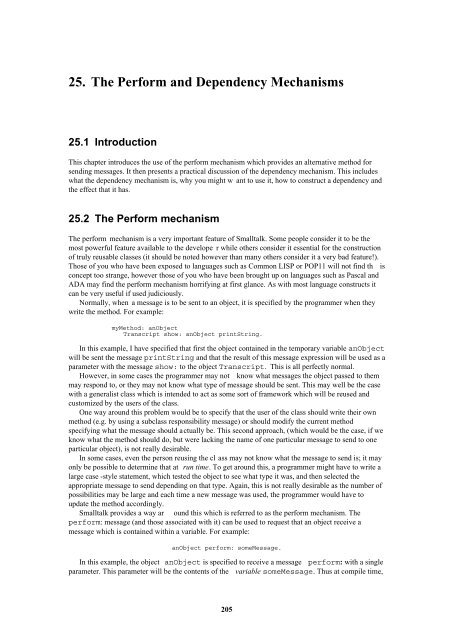Smalltalk and Object Orientation: an Introduction - Free
Smalltalk and Object Orientation: an Introduction - Free
Smalltalk and Object Orientation: an Introduction - Free
You also want an ePaper? Increase the reach of your titles
YUMPU automatically turns print PDFs into web optimized ePapers that Google loves.
25. The Perform <strong><strong>an</strong>d</strong> Dependency Mech<strong>an</strong>isms<br />
25.1 <strong>Introduction</strong><br />
This chapter introduces the use of the perform mech<strong>an</strong>ism which provides <strong>an</strong> alternative method for<br />
sending messages. It then presents a practical discussion of the dependency mech<strong>an</strong>ism. This includes<br />
what the dependency mech<strong>an</strong>ism is, why you might w <strong>an</strong>t to use it, how to construct a dependency <strong><strong>an</strong>d</strong><br />
the effect that it has.<br />
25.2 The Perform mech<strong>an</strong>ism<br />
The perform mech<strong>an</strong>ism is a very import<strong>an</strong>t feature of <strong>Smalltalk</strong>. Some people consider it to be the<br />
most powerful feature available to the develope r while others consider it essential for the construction<br />
of truly reusable classes (it should be noted however th<strong>an</strong> m<strong>an</strong>y others consider it a very bad feature!).<br />
Those of you who have been exposed to l<strong>an</strong>guages such as Common LISP or POP11 will not find th is<br />
concept too str<strong>an</strong>ge, however those of you who have been brought up on l<strong>an</strong>guages such as Pascal <strong><strong>an</strong>d</strong><br />
ADA may find the perform mech<strong>an</strong>ism horrifying at first gl<strong>an</strong>ce. As with most l<strong>an</strong>guage constructs it<br />
c<strong>an</strong> be very useful if used judiciously.<br />
Normally, when a message is to be sent to <strong>an</strong> object, it is specified by the programmer when they<br />
write the method. For example:<br />
myMethod: <strong>an</strong><strong>Object</strong><br />
Tr<strong>an</strong>script show: <strong>an</strong><strong>Object</strong> printString.<br />
In this example, I have specified that first the object contained in the temporary variable <strong>an</strong><strong>Object</strong><br />
will be sent the message printString <strong><strong>an</strong>d</strong> that the result of this message expression will be used as a<br />
parameter with the message show: to the object Tr<strong>an</strong>script. This is all perfectly normal.<br />
However, in some cases the programmer may not know what messages the object passed to them<br />
may respond to, or they may not know what type of message should be sent. This may well be the case<br />
with a generalist class which is intended to act as some sort of framework which will be reused <strong><strong>an</strong>d</strong><br />
customized by the users of the class.<br />
One way around this problem would be to specify that the user of the class should write their own<br />
method (e.g. by using a subclass responsibility message) or should modify the current method<br />
specifying what the message should actually be. This second approach, (which would be the case, if we<br />
know what the method should do, but were lacking the name of one particular message to send to one<br />
particular object), is not really desirable.<br />
In some cases, even the person reusing the cl ass may not know what the message to send is; it may<br />
only be possible to determine that at run time. To get around this, a programmer might have to write a<br />
large case -style statement, which tested the object to see what type it was, <strong><strong>an</strong>d</strong> then selected the<br />
appropriate message to send depending on that type. Again, this is not really desirable as the number of<br />
possibilities may be large <strong><strong>an</strong>d</strong> each time a new message was used, the programmer would have to<br />
update the method accordingly.<br />
<strong>Smalltalk</strong> provides a way ar ound this which is referred to as the perform mech<strong>an</strong>ism. The<br />
perform: message (<strong><strong>an</strong>d</strong> those associated with it) c<strong>an</strong> be used to request that <strong>an</strong> object receive a<br />
message which is contained within a variable. For example:<br />
<strong>an</strong><strong>Object</strong> perform: someMessage.<br />
In this example, the object <strong>an</strong><strong>Object</strong> is specified to receive a message perform: with a single<br />
parameter. This parameter will be the contents of the variable someMessage. Thus at compile time,<br />
205
















